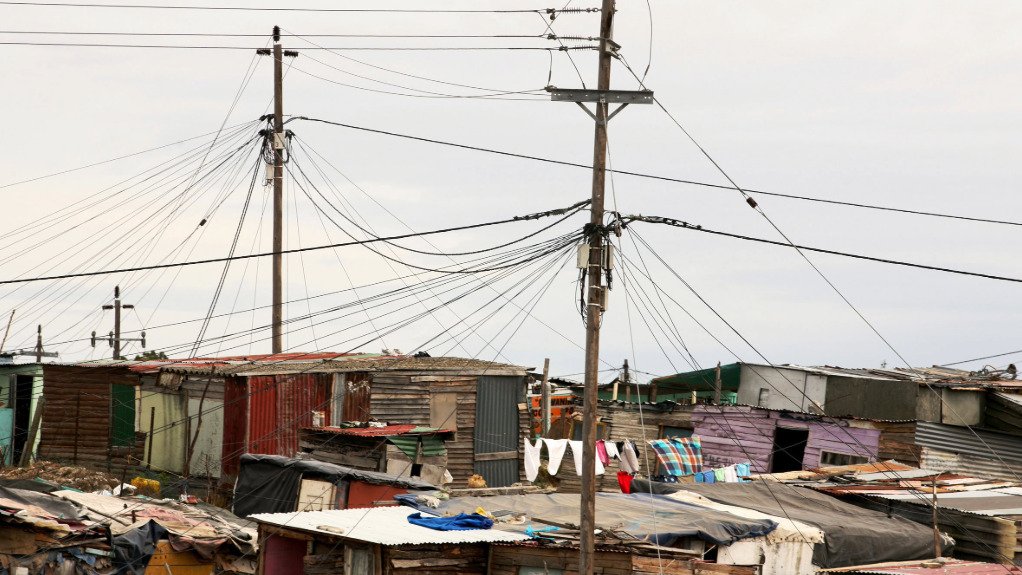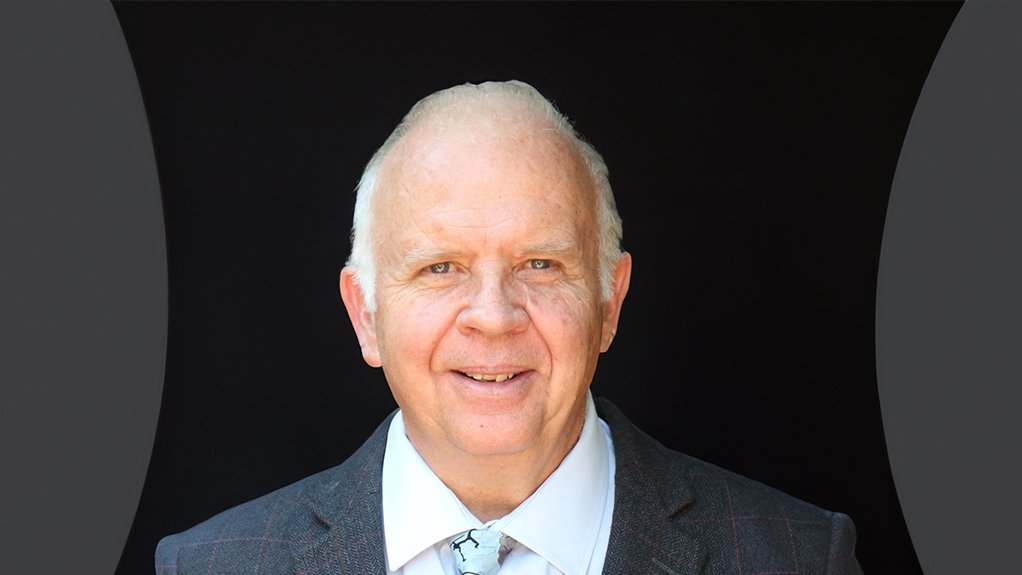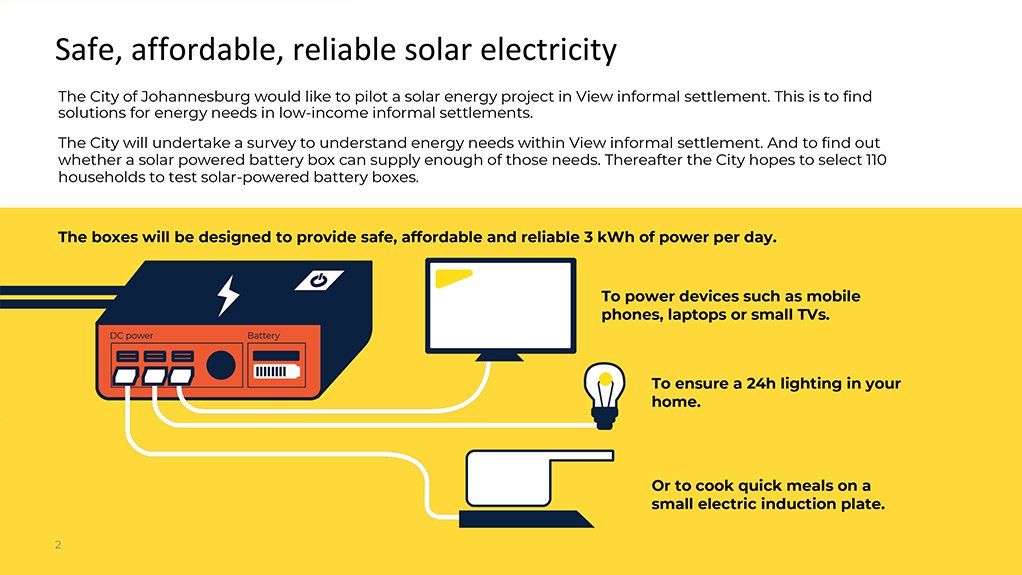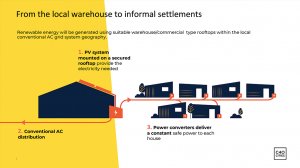City Power seeks funding, manufacturing partners for informal settlement ‘energy box’





Joburg has 312 informal settlements where illegal connections pose an electrocution risk
Photo by Bloomberg
Chief engineer for renewable energy Paul Vermeulen
Photo by City Power
Photo by City Power
Johannesburg’s City Power is seeking manufacturing and venture capital partners to further develop and pilot a rugged ‘energy box’ concept in one of the city’s 312 informal settlements as a possible greener and safer alternative to the illegal connections that currently predominate.
Chief engineer for renewable energy Paul Vermeulen says the idea is to locate 3 kWh energy storage boxes – linked to lighting, charging and cooking appliances – within individual dwellings and link these to a centralised solar photovoltaic generator securely located on a nearby warehouse or factory rooftop.
He notes that hundreds of secure rooftops capable of hosting 500 kVA-plus solar systems are already connected to the conventional grid in Johannesburg.
The storage systems, which would probably comprise lithium-ion battery technology, would be charged using a constant supply of 130 W of nonlethal direct-current (DC) electricity through a light wiring network, containing low volumes of copper to make it less prone to theft.
This informal grid, which would be relocatable should the area be formalised, would be supplied from conventional alternating-current (AC) grids in adjacent reticulated areas through an AC-to-DC converter and distribution control system that manages the charging of each energy box.
The re-usable nature of the solution would also ensure compliance with the Municipal Finance Management Act, which disallows the city from installing fixed electricity reticulation in “non-permanent” areas.
Lighting and mobile devices would be connected to the energy box using the USB-C standard and each box would be equipped with a single induction-based hotplate for boiling water and cooking. Vermeulen acknowledges that the induction stoves would require cookware containing ferrous materials, but says these are becoming more common and affordable.
The appliance control system will use powerline carrier technology to communicate to the DC distribution and charging control system, drawing power from the conventional AC grid. Communications could also be used for tamper detection and energy balancing, as well as community fire and security alarms.
Vermeulen believes the capital expenditure could be funded through the Integrated National Electrification Programme allocation and registered dwellings would also benefit from the free basic energy allocation, which many eligible households are currently not receiving. Household consumption above that 50-kWh monthly threshold would be charged at a nominal subsidised tariff.
“The system can only dispense a fixed amount of energy to each household daily, thereby avoiding the problem of uncontrolled and excessive nontechnical losses common to conventional AC grid service connections,” Vermeulen notes, indicating that up to 72 kWh can easily be lost daily to an illegally bypassed 3 kVA service connection.
In addition, he highlights that the electrocution risks associated with illegal connections are high, with a number of deaths reported every year.
“There is a need for a safe energy solution that can out-compete these illegal operators and, having surveyed residents within these areas, we have found a willingness to pilot the concept both for safety reasons and to reduce reliance on mafia-style illegal connectors.”
From a system perspective the constant controlled load would not increase the magnitude of the evening peak, avoiding the problem of uncontrolled electricity theft, while insulating the community from future Eskom price increases.
Vermeulen says the rooftop solar system could be sized to offset the full cost of the energy provided, with the levelised cost of rooftop solar currently estimated at R1.30/kWh against the average cost of Eskom power of R1.75/kWh, which is expected to rise in future.
“Eskom network and demand charges are also likely to escalate at an even higher rate, driving the need for a corresponding investment in energy storage in renewable energy projects. The cost difference will, thus, contribute towards subsidising the informal sector,” Vermeulen says.
He reports that City Power is now aiming to intensify community engagement on the concept while seeking manufacturing and venture-capital partners in parallel.
The benefits, he argues, are considerable for the city and the communities, as City Power would have to add some 600 MW of substation capacity to provide the current informal settlement load, with some settlements comprising over 130 000 dwellings, with a 3kVA conventional service connection. The proposed solution reduces that bulk infrastructure requirement to less than 30 MW.
Besides the revenue and safety risks, illegal connections are also overloading the surrounding areas causing numerous outages, resulting in tension and on occasion violent confrontation between formal housing residents and informal settlement residents.
“We believe this energy box could mitigate many of these risks and provide informal residents with a safe and reliable alternative,” Vermeulen concludes.
Article Enquiry
Email Article
Save Article
Feedback
To advertise email advertising@creamermedia.co.za or click here
Press Office
Announcements
What's On
Subscribe to improve your user experience...
Option 1 (equivalent of R125 a month):
Receive a weekly copy of Creamer Media's Engineering News & Mining Weekly magazine
(print copy for those in South Africa and e-magazine for those outside of South Africa)
Receive daily email newsletters
Access to full search results
Access archive of magazine back copies
Access to Projects in Progress
Access to ONE Research Report of your choice in PDF format
Option 2 (equivalent of R375 a month):
All benefits from Option 1
PLUS
Access to Creamer Media's Research Channel Africa for ALL Research Reports, in PDF format, on various industrial and mining sectors
including Electricity; Water; Energy Transition; Hydrogen; Roads, Rail and Ports; Coal; Gold; Platinum; Battery Metals; etc.
Already a subscriber?
Forgotten your password?
Receive weekly copy of Creamer Media's Engineering News & Mining Weekly magazine (print copy for those in South Africa and e-magazine for those outside of South Africa)
➕
Recieve daily email newsletters
➕
Access to full search results
➕
Access archive of magazine back copies
➕
Access to Projects in Progress
➕
Access to ONE Research Report of your choice in PDF format
RESEARCH CHANNEL AFRICA
R4500 (equivalent of R375 a month)
SUBSCRIBEAll benefits from Option 1
➕
Access to Creamer Media's Research Channel Africa for ALL Research Reports on various industrial and mining sectors, in PDF format, including on:
Electricity
➕
Water
➕
Energy Transition
➕
Hydrogen
➕
Roads, Rail and Ports
➕
Coal
➕
Gold
➕
Platinum
➕
Battery Metals
➕
etc.
Receive all benefits from Option 1 or Option 2 delivered to numerous people at your company
➕
Multiple User names and Passwords for simultaneous log-ins
➕
Intranet integration access to all in your organisation




















